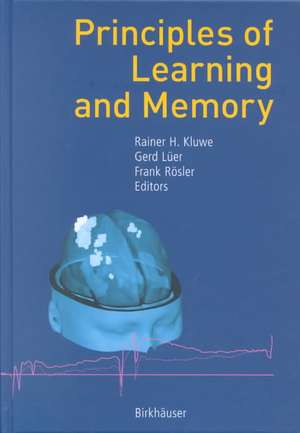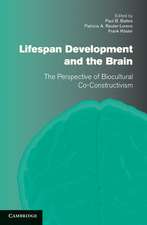Principles of Learning and Memory
Editat de Rainer H. Kluwe, Gerd Lüer, Frank Rösleren Limba Engleză Hardback – 11 dec 2002
| Toate formatele și edițiile | Preț | Express |
|---|---|---|
| Paperback (1) | 393.13 lei 6-8 săpt. | |
| Birkhäuser Basel – 30 oct 2012 | 393.13 lei 6-8 săpt. | |
| Hardback (1) | 398.35 lei 6-8 săpt. | |
| Birkhäuser Basel – 11 dec 2002 | 398.35 lei 6-8 săpt. |
Preț: 398.35 lei
Nou
Puncte Express: 598
Preț estimativ în valută:
76.23€ • 79.95$ • 63.46£
76.23€ • 79.95$ • 63.46£
Carte tipărită la comandă
Livrare economică 01-15 aprilie
Preluare comenzi: 021 569.72.76
Specificații
ISBN-13: 9783764366995
ISBN-10: 3764366990
Pagini: 380
Ilustrații: XV, 358 p.
Dimensiuni: 155 x 235 x 26 mm
Greutate: 0.66 kg
Ediția:2003
Editura: Birkhäuser Basel
Colecția Birkhäuser
Locul publicării:Basel, Switzerland
ISBN-10: 3764366990
Pagini: 380
Ilustrații: XV, 358 p.
Dimensiuni: 155 x 235 x 26 mm
Greutate: 0.66 kg
Ediția:2003
Editura: Birkhäuser Basel
Colecția Birkhäuser
Locul publicării:Basel, Switzerland
Public țintă
ResearchCuprins
A Formation of Memories.- 1 The Principle of Contiguity.- 2 The Principle of Learning Based on Multiple Brain Structures.- 3 The Principles of Brain Plasticity.- 4 The Principle of Emotional Learning.- B Organization of Memories.- 5 The Principle of Code-Specific Memory Representations.- 6 The Principle of Multiple Memory Systems.- 7 Modules of Working Memory.- C Consolidation of Memories.- 8 The Principle of Memory Consolidation and Its Pharmacological Modulation.- 9 The Principle of Cross-Cortical Consolidation of Declarative Memories.- 10 The Principle of Bottleneck Structures.- D Control of Memories.- 11 The Principle of Controlling Neuronal Dynamics in Neocortex: Rapid Reorganization and Consolidation of Neuronal Assemblies.- 12 The Principle of Inhibition.- 13 Towards Principles of Executive Control: How Mental Sets are Selected.- E Adaptive Specialization of Memories.- 14 The Principle of Species Independent Learning Phenomena.- 15 The Principle of Adaptive Specialization as It Applies to Learning and Memory.- References.- Name Index.- List of Contributors.
Textul de pe ultima copertă
Principles of Learning and Memory focuses on the most actual and central phenomena, which are discussed from an interdisciplinary point of view in five sections: formation, organization, consolidation, control, and adaptive specialization of memories. The editors’ intention is to present state-of-the-art reviews that cover the experimental analysis of behavior, as well as the biological basis of learning and memory, and that overcome traditional borders separating disciplines. The authors met in March 2001 for a three-day conference, where they discussed their planned contributions. The resulting chapters present and evaluate core findings of human learning and memory that are obtained in different fields of research and on different levels of analysis (e.g., cellular, neural network, behavioral level). The volume provides an integrated pattern of results wherever this is possible. The reader will acquire a broad and integrated perspective of human learning and memory based on current approaches in this domain.
Principles of Learning and Memory is a textbook for researchers and advanced students in biology, cognitive psychology, neuroscience, and cognitive science.
Features and benefits:
- Combines well-established central principles and phenomena and current approaches from cognitive science, neuroscience, and biology to emphasize connections between the findings in these different domains of research
- Takes into account results from empirical research and modeling approaches
- The contents are grouped into five sections:
A. Formation of Memories
B. Organization of Memories
C. Consolidation of Memories
D. Control of Memories
E. Adaptive Specialization of Memories
- Contains an integrated bibliography, a name index, and a subject index
- The editors and authors are well known scientists, who have made significantcontributions to the field of learning and memory
Principles of Learning and Memory is a textbook for researchers and advanced students in biology, cognitive psychology, neuroscience, and cognitive science.
Features and benefits:
- Combines well-established central principles and phenomena and current approaches from cognitive science, neuroscience, and biology to emphasize connections between the findings in these different domains of research
- Takes into account results from empirical research and modeling approaches
- The contents are grouped into five sections:
A. Formation of Memories
B. Organization of Memories
C. Consolidation of Memories
D. Control of Memories
E. Adaptive Specialization of Memories
- Contains an integrated bibliography, a name index, and a subject index
- The editors and authors are well known scientists, who have made significantcontributions to the field of learning and memory
Caracteristici
COMBINES CENTRAL PRINCIPLES AND PHENOMENA AND CURRENT APPROACHES FROM COGNITIVE SCIENCE, NEUROSCIENCE, AND BIOLOGY TO EMPHASIZE CONNECTIONS BETWEEN THE FINDINGS IN THESE DIFFERENT DOMAINS TAKES INTO ACCOUNT RESULTS FROM EMPIRICAL RESEARCH AND MODELING APPROACHES WRITTEN BY WELL KNOWN SCIENTISTS, WHO HAVE MADE SIGNIFICANT CONTRIBUTIONS TO THE FIELD OF LEARNING AND MEMORY INTEGRATED BIBLIOGRAPHY NAME INDEX SUBJECT










